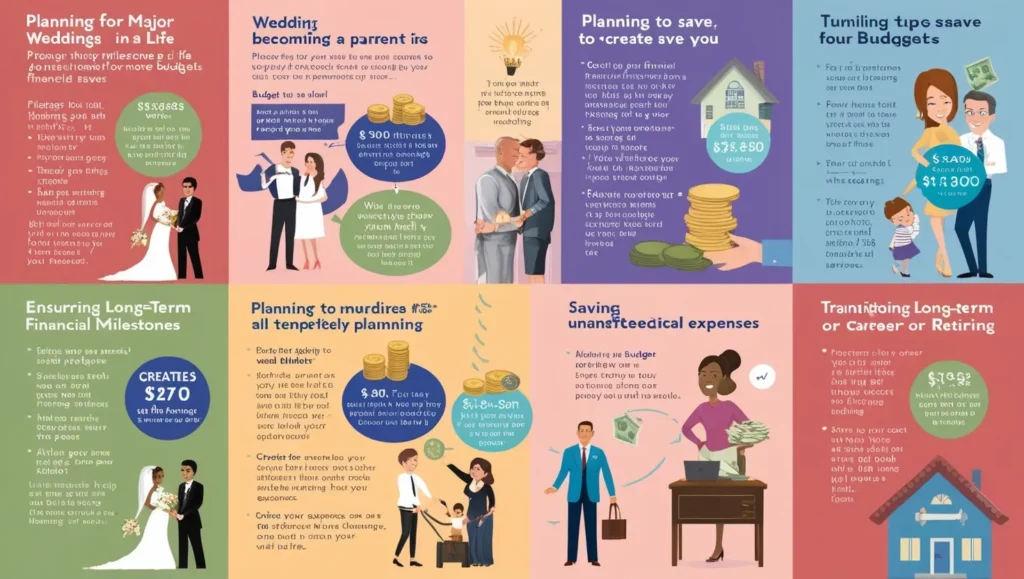Budgeting for Major Life Events Weddings Kids and More
Life is full of significant milestones that bring joy, excitement, and, often, financial challenges. Events like weddings, starting a family, and other major life changes can put considerable strain on your finances if not properly planned. The key to enjoying these moments lies in effective budgeting and financial preparation. Here’s an in-depth guide to help you navigate the financial intricacies of major life events while maintaining peace of mind.
1. Budgeting for Weddings
Weddings are one of life’s most celebrated occasions, but they can also be one of the most expensive. Here’s how to plan wisely:
Set a Realistic Budget
Determine the total amount you’re willing to spend. Break it down into categories such as venue, catering, attire, photography, and entertainment.
Prioritize Spending
Decide what aspects of the wedding matter most to you. Allocate more of your budget to these priorities, and look for cost-saving options for less important areas.
Plan Early
Start saving as soon as possible. Open a separate savings account dedicated to wedding expenses.
DIY and Alternatives
- Create DIY decorations or invitations to save money.
- Consider weekday or off-season dates for discounts on venues and services.
- Opt for smaller, intimate ceremonies to reduce costs.
Track Expenses
Use budgeting tools or apps to monitor your spending and avoid overspending.
2. Budgeting for Kids
Having children is a joyful milestone but comes with ongoing financial responsibilities. From diapers to education, here’s how to prepare:
Pre-Baby Planning
- Medical Costs: Budget for prenatal care, delivery expenses, and any additional medical costs.
- Baby Essentials: Include items like cribs, strollers, and clothing in your budget.
- Parental Leave: Consider the potential loss of income if you or your partner take time off work.
Childcare and Education
- Childcare: Research daycare costs or alternative options like family care.
- Education Savings: Start a dedicated savings account for your child’s future education, such as a 529 plan or equivalent in your country.
Everyday Expenses
Factor in ongoing costs like diapers, food, and healthcare. Bulk buying and using coupons can help save money.
3. Budgeting for Buying a Home
Homeownership is a common aspiration but requires meticulous planning to ensure financial stability.
Assess Affordability
Determine how much you can afford by considering your income, expenses, and debt-to-income ratio.
Save for a Down Payment
The larger your down payment, the lower your monthly mortgage payments. Aim for at least 20% to avoid private mortgage insurance (PMI).
Consider Additional Costs
Include closing costs, property taxes, homeowner’s insurance, and maintenance expenses in your budget.
Shop for the Best Loan
Compare mortgage rates and terms from various lenders to find the best deal.
4. Budgeting for Career Changes
A career transition, whether for growth or personal reasons, can affect your financial stability.
Emergency Fund
Save at least 6–12 months’ worth of living expenses before making a major career move.
Upskilling Costs
If your career change requires new skills or certifications, budget for education or training expenses.
Income Gap Planning
Account for any potential income gap during the transition and adjust your spending accordingly.
5. Budgeting for Retirement
Retirement may seem far off, but the earlier you plan, the better.
Start Saving Early
Contribute consistently to retirement accounts like 401(k)s or IRAs. Take advantage of employer matching if available.
Estimate Future Needs
Consider your desired lifestyle and factor in potential medical expenses when calculating how much you’ll need.
Diversify Investments
Balance your portfolio with a mix of stocks, bonds, and other assets to grow your savings while minimizing risks.
General Budgeting Tips for Major Life Events
- Create a Dedicated Savings Fund
Open separate accounts for each major event to track savings and expenses clearly. - Cut Unnecessary Expenses
Identify areas where you can reduce spending to allocate more towards your goals. - Use Budgeting Tools
Apps like Mint, YNAB (You Need a Budget), or spreadsheets can help manage your finances efficiently. - Seek Professional Advice
Consider consulting a financial planner to navigate complex financial decisions. - Stay Flexible
Unexpected expenses are inevitable. Build a buffer into your budget to accommodate surprises.
Final Thoughts
Major life events are milestones to cherish, not stress over. With careful planning and disciplined budgeting, you can enjoy these moments without compromising your financial well-being. Whether it’s a dream wedding, welcoming a new child, or preparing for retirement, starting early and staying organized will set you up for success.
What’s your next big life event? Start planning today to make it as memorable and stress-free as possible!

